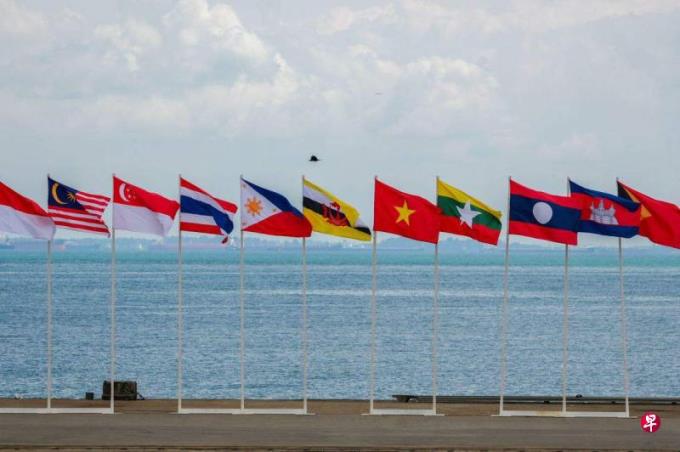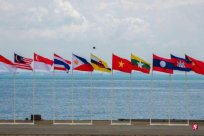
In the history of Southeast Asian countries, they have experienced colonial rule of major or strong powers, knowing the value of independence.It is because the regionalism and architecture of Asia's Simpan can most guarantee their independence and independence, so it has become the largest number of equivalent, and is accepted and pursued by everyone.After decades of evolution, this regionalist values can now be said to be highly internalized.
The recent two days of "Asia Foreign -looking Summit" can be described as a good drama, with a splash and exciting.There is no doubt that at this moment, in conjunction with the commemoration of Singaporean founder Lee Kuan Yew's century, he gathered the political and academic elites from all Asian countries.Against time.
Here's a single table involves the discussion of Asia's fine security. Two guests who were invited to publish opinions, one was the text of the former Ambassador of Japan in Indonesia, and the other was Liao Zhenyang, a professor of comparison with politics and international political Chen Jiageng of Nanyang University of Science and Technology.The speech of the text of Ishii made us rarely hear the special views of Asia in Japan.
He revealed that the Japanese Ministry of Foreign Affairs (Ministry of Foreign Affairs) conducted annual public opinion investigations on member states of Asians since 2008. One of the main questions in the questionnaire is: Which country do you think in the future is more important to you?Which country would you rely on?The results of the 15 -year survey have unanimously showed that the answers of three countries in the 10 countries in Yajia'an have always been: Japan.These three countries that are more important in Japan are Indonesia, Vietnam and the Philippines.He called them the "Three Kingdoms".The three countries will help the United States and Japan at all times.
Followed by the so -called "Central Three Kingdoms", referring to Thailand, Malaysia, and Myanmar, their positions are swaying between Japan and China.Once again "Little Three Kingdoms": Cambodia, Laos and Brunei.What about Singapore?Ishii said Singapore is a special case.If you ask on the street, 95%of the answer will be China (I press: This is obviously preconceived).But in fact, Singapore also allows the U.S. military to use facilities, and also has military training in Taiwan. Former Prime Minister also played golf in Taiwan.
Is not optimistic about the prospects of Asia?
The information revealed by Ishii is that Japan will give priority to the exchanges with the sub -safe country with the Asianship, but it also emphasizes that it will be very careful to maintain a balance to avoid being considered to be divided into Asia.The basic policy route in Japan is to keep Ayan unity.According to the Straits Times, Ishai's prospects for Asia Sea seem to be not optimistic. He estimates that the Asia Safe will be more and more split in 20 years.Although everyone is not willing to choose the side stations between China and the United States, they are already in their hearts.I have to say that this at best is just a speculation. Ishii does not seem to have the ability to "see the eyes."
It is unknown how the Japanese conduct their investigations.However, Liao Zhenyang, who spoke in the same scene, was surprised to include Indonesia in the US camp, but the explanation of Ishii was that this was a conclusion that Japan received from direct contact.For example, during the Duterte period, although it was on the surface, it still relied on the United States.As for Indonesia, he is unwilling to explain more.
In any case, Japan now attaches great importance to Indonesia and India.Ishii believes that in the polar world headed by China and the United States, India and Indonesia will become an important rise for the future. It is determined that the two camps of China and the United States can better dominate international public opinion.EssenceAs for China, Ishii said that what Japan wants is coexistence and competition.
From the perspective of our Asianan member, if Ishii's remarks really represent Japanese official ideas, there are two main points.One of them is of course divided into four in Asia; the other is an optimistic prediction of the prospects of Asia's exposure.At least we now know that although Japan emphasizes the need to maintain the unity of Asia, it is actually "segmentation".This approach seems to be layout for the possible split in the future of Asia.
Asiabe will be as predicted, will it become more and more split after 20 years?Founded in 1967, Ya'an, now 56 years old.From the perspective of the development of development, it is constantly good, although there are twists and turns in the middle.Today's Asianan can exert its influence in terms of economic strength, market potential, and regional affairs, which is far greater than in half a century.This quite special regional cooperation structure is also closer to the same match than before, and it is more economically integrated.However, a more important change that can be perceived from the group action of the Asianan is not visible, which is the internalization of some values.
Here refers to the internalization of regionalism.Regionalism is relative to nationalism, or regional interests are relative to national interests.These two do not necessarily fit fully.To achieve the goal of regionalism, member states may need to make adjustments or concessions in national interests, because regional interests are greater than national interests.To achieve regional interests, it can better protect the national interests of everyone.Ya'an is such a regional architecture.
Maintaining autonomy is the most precious asset in Ya'an
If any Southeast Asian country acts separately, it is impossible to play as a whole role as a sub -security.This is just like the metaphor in the fable, a arrow is easy to break, and a bouquet of arrows is difficult.This should be a consensus that a member country has since the moment of the establishment of Yajian.Former Singapore diplomat Birahari was still not an islands in Singapore in the new book, quoting a paragraph that the first Foreign Minister Lajilitan signed the Bangkok Declaration (that is, the Asian Danian) that year was evidence."From now on, we must adopt new thinking, and regional interests must be part of the national interests defined by each member state." Other foreign ministers also delivered the same purpose at the time.(See the second part of the book: Asianan and Southeast Asia)
Historically in the history of Southeast Asia has experienced colonial rule of major or strong powers, knowing the value of independence.It is because the regionalism and architecture of Asia's Simpan can most guarantee their independence and independence, so it has become the largest number of equivalent, and is accepted and pursued by everyone.After decades of evolution, this regionalist values can now be said to be highly internalized.Although on the surface, countries are based on their own national conditions, and there are different practices in diplomacy. Some of them are closer to China on the surface, and some are closer to the United States, but they do not mean that they are differentiated or split, and they are not already selected.
As pointed out by Liao Zhenyang, in fact, none of the Southeast Asian countries can choose to cooperate with only one of China and the United States.We may add that both China and the United States can actually not have to be in peace.Asianan has always emphasized that it is open and tolerant, so that all stakeholders (especially China and the United States) are involved.However, in regional affairs, Asian'an has always maintained its core or dominant position.
Maintaining autonomy is the firm position of Asian security, and it is also its most valuable asset and strength.All member states should be very clear. Only by maintaining unity can we maintain this asset, accumulate this force, and most effectively protect the national interests of each member country.With the current struggle between the two major countries of China and the United States, according to reasonable logic, it is necessary to promote the unity of the Asian member states rather than split, because regardless of any party, it does not meet the long -term national interests of each member country.Because falling to one side is equivalent to losing autonomy.It is the top priority to unite to respond to the new world bureau in front of me. As for what may happen 20 years later, we can only ride a donkey to watch the singing book -walk around.


